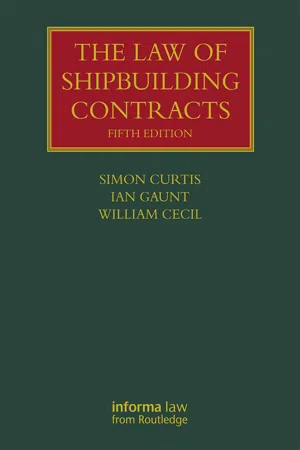
- 408 pages
- English
- ePUB (mobile friendly)
- Available on iOS & Android
The Law of Shipbuilding Contracts
About this book
The Law of Shipbuilding Contracts examines the principles of English contract law as these apply to shipbuilding. The leading text on shipbuilding and marine construction, widely used by the global maritime community, this new edition is updated to account for the "long tail" effects of the global economic crisis on the sector.
The authors provide expert analysis on the key shipbuilding contract forms, including sections dealing with agreements ancillary to the shipbuilding contract and ship conversion contracts, together with — for the first time — contracts for the construction of offshore oil and gas vessels and units. The new edition has been comprehensively updated, including commentary on recent High Court decisions on shipbuilding contracts and, in particular, associated refund guarantees. The contractual and legal consequences of global economic turbulence and the resultant increase in the number and size of disputes in the shipbuilding sector are discussed, alongside coverage of other contemporary regulatory and legal issues resulting from environmental pressures and the trend for "cleaner", more efficient tonnage.
A comprehensive and authoritative resource, this book is essential reading for buyers and charterers of newbuilding tonnage, shipbuilders and offshore construction yards, shipbrokers, banks and other finance providers, lawyers and insurers working in the maritime and offshore oil and gas sectors, as well as students of maritime law.
Frequently asked questions
- Essential is ideal for learners and professionals who enjoy exploring a wide range of subjects. Access the Essential Library with 800,000+ trusted titles and best-sellers across business, personal growth, and the humanities. Includes unlimited reading time and Standard Read Aloud voice.
- Complete: Perfect for advanced learners and researchers needing full, unrestricted access. Unlock 1.4M+ books across hundreds of subjects, including academic and specialized titles. The Complete Plan also includes advanced features like Premium Read Aloud and Research Assistant.
Please note we cannot support devices running on iOS 13 and Android 7 or earlier. Learn more about using the app.
Information
PART 1
The nature of the shipbuilding contract
Table of contents
- Cover
- Half Title
- Series Page
- Title Page
- Copyright Page
- Table of Contents
- Foreword
- Preface
- Table of cases
- Table of statutes
- PART 1—THE NATURE OF THE SHIPBUILDING CONTRACT
- PART 2—THE FORMATION OF THE SHIPBUILDING CONTRACT
- PART 3—STANDARD TERMS
- PART 4—AGREEMENTS ANCILLARY TO THE SHIPBUILDING CONTRACT
- PART 5—SHIP CONVERSION CONTRACTS
- APPENDIX A BIMCO STANDARD NEWBUILDING CONTRACT (NEWBUILDCON FORM)
- APPENDIX B INSTITUTE CLAUSES FOR BUILDERS’ RISKS
- Index